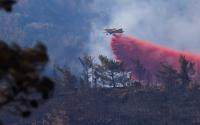2 December 2009Common Dreams
Here's a story of two presidents, Barack Obama of the United States and Mohamed Nasheed of the Maldives.
Both are young and charismatic. Both were elected last fall to replace discredited incumbents. Both have troublesome legislatures.
But on the biggest question the planet faces - if we'll take action in time to slow down global warming - they couldn't be more different. They both may go to the U.N.-sponsored climate conference in Copenhagen this month, but Nasheed will be there to say: Seize the moment. If Obama makes it, he will be there to spin, to say, no doubt elegantly: Chill.
In Nasheed's case, geography almost requires him to be outspoken. His nation is what you picture when you picture paradise: 1,200 tiny islands, each ringed by a reef with a lagoon, white sand beaches and coconut palms. A small fraction have been turned into tourist resorts, but most are either uninhabited or home to fishing communities.
But the highest point on most of those islands is only a few feet above sea level. They can't cope with the rising oceans that every expert says global warming will bring, and they can't cope with the dying corals that come when seawater gets hotter and more acidic. And so, more than any other leader on Earth, Nasheed has made global warming his rallying cry.
He's versed in the latest science. He knows, for instance, that trying to limit global warming to 2 degrees Celsius and atmospheric levels of carbon dioxide to 450 parts per million is no longer a viable goal. That given what science now shows, the much tougher target of 350 parts per million represents his country's only chance for survival. As Rajendra Pachauri, the only scientist ever to accept the Nobel Prize for his work on climate, said this month: At 450 ppm, the Maldives and many other islands, as well as larger low-lying countries such as Bangladesh, "will be completely devastated."
So Nasheed has gone to work. Some of his actions have been symbolic: As part of a global day of climate action that I helped organize, he trained his entire cabinet to scuba dive so they could hold an underwater meeting on an endangered coral reef; they signed a resolution to be presented at the Copenhagen summit demanding that nations take steps to return the atmosphere's carbon level to 350 parts per million. To show its willingness to lead, the Maldives (a poor nation) has committed to being carbon neutral by 2020. There are lots of wind towers on the way, and I've seen plans for farming seaweed to make biofuels.
Contrast that with Obama. He's done more than his three predecessors combined. He's taken admirable steps on automobile fuel economy, put stimulus money into green job plans, and surrounded himself with an excellent cast of scientific advisers. But doing more than George W. Bush on global warming is like doing more than George Wallace on racial healing. It gives you political cover, but the melting Arctic ice is unimpressed.
So it's not good news that Obama's spokesmen have stuck to the 450 ppm/2 degree target, calling it consensus science when it no longer is. And it's not good news that Obama turned climate legislation over to Congress to produce, slotting it behind health care on his list of priorities. Since he'd just spent some years in the Senate, the president should have been able to predict what would happen: The already none-too-strong Waxman-Markey (House) and Kerry-Boxer (Senate) bills have been laden with ever more gifts to ever more special interests and ever more loopholes to undermine their targets.
Obama's excuse is that the Senate won't OK tough climate legislation, so there's no use pushing for it. (And he's right - the Senate is tough. At 350.org, an organization I co-founded that is dedicated to solving the climate crisis, we're working to organize candlelight vigils at senators' offices around the country.) But that's conceding the game without taking a shot.
Imagine an American president who would take the press corps to Glacier National Park so they could hike the dwindling ice fields, then fly them above the millions of acres of dead lodgepole pines covering much of the West, and then take them to stand on the levees in New Orleans. These are the kinds of stunts Obama knew how to pull off when he was running for president.
And they're exactly what he needs to do if we're going to deal with climate in the short time science gives us. A mediocre health care bill is one thing; you can probably come back in a generation and make it stronger. People may suffer in the meantime, but the problem won't become logarithmically worse. The climate, on the other hand, is full of traps and tipping points - let it get warm enough to melt the permafrost that locks away vast supplies of methane, and no future president will be able to control the heating. If there were ever a challenge that called for focus, this is it.
At the Asia-Pacific Economic Cooperation summit in Singapore, one of the U.S. spokesmen said: "There was an assessment by the leaders that it is unrealistic to expect a full, internationally legally binding agreement could be negotiated between now and Copenhagen, which starts in 22 days."
This is pathetic spin. Copenhagen has been on the calendar for years - it's not a surprise that someone sprung on the president, who shortly after last year's election declared: "Once I take office, you can be sure that the United States will once again engage vigorously in these negotiations and help lead the world toward a new era of global cooperation on climate change. Now is the time to confront this challenge once and for all. Delay is no longer an option. Denial is no longer an acceptable response. The stakes are too high."
The stakes didn't get any lower in the past 12 months. In fact, NASA recently issued new data showing that the world has just come through the warmest June-October period in recorded history. Meanwhile, officials at a U.N. summit on hunger were describing new research that showed temperature increases above 2 degrees could cut crop yields by a fifth in poor countries. Meanwhile, a new study showed jellyfish swarming across the world's oceans as temperatures rise, driving out the species people need for food. Meanwhile - day after day - the list gets longer.
Obama always gets high marks for his cool, his lack of drama. His patience. Maybe he should learn a thing or two from Nasheed.






